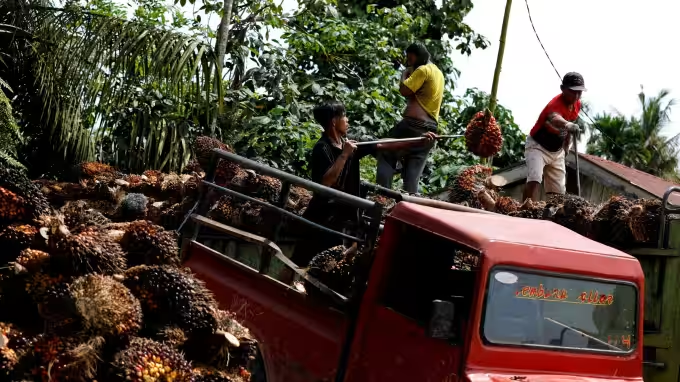Global palm oil producers are preparing for a potential oversupply following Indonesia’s decision to impose new restrictions on its palm oil exports. The policy change, which aims to prioritize domestic supply and control local prices, is expected to flood international markets with excess palm oil, causing downward pressure on prices.
Indonesia, the world’s largest producer and exporter of palm oil, announced stricter export quotas to ensure adequate supplies for its domestic market. The move comes as the government seeks to stabilize the price of cooking oil, a staple for millions of Indonesians. Under the new regulations, exporters must allocate a higher percentage of their palm oil output for local consumption before receiving approval for international shipments.
Analysts warn that Indonesia’s export restrictions could create a backlog of palm oil within the country, leading to an oversupply in the months ahead. As stocks accumulate, producers face increased pressure to offload excess supply once export quotas ease, which could result in a sharp drop in global palm oil prices.
Neighboring Malaysia, the second-largest palm oil producer, may also experience indirect effects. With Indonesian exports temporarily limited, some buyers may shift their focus to Malaysia. However, once Indonesia resumes full export capacity, the sudden surge in supply could trigger a market glut, lowering prices for both countries.
Market analysts project that palm oil prices, which had shown signs of stabilizing after recent volatility, could face further declines if the global market becomes saturated. This could have ripple effects on other vegetable oils, including soybean oil and sunflower oil, as consumers and industries shift to more affordable alternatives.
Palm oil producers in Southeast Asia are preparing for operational challenges as they navigate uncertain market conditions. An extended oversupply could lead to inventory build-ups, storage issues, and financial losses if prices fall below production costs. Smaller producers, who already face rising labor and fertilizer costs, are particularly vulnerable.
Large agribusinesses like Wilmar International, Sime Darby Plantation, and Golden Agri-Resources are closely monitoring the situation. Industry leaders are calling for policy clarity from the Indonesian government to avoid market disruptions and ensure stable trade flows.
Export-dependent economies could also face broader economic impacts. Indonesia’s palm oil industry is a major contributor to government revenue, employment, and rural livelihoods. Prolonged export restrictions may slow foreign exchange earnings, particularly if palm oil inventories become difficult to offload.
Key palm oil importers, including India, China, and the European Union, are adjusting their purchasing strategies in response to Indonesia’s policy shift. Importers are concerned about supply uncertainties and potential price swings as market dynamics fluctuate. Some buyers are stockpiling palm oil in anticipation of future shortages, while others are exploring alternative sources.
The food and biofuel industries, which rely heavily on palm oil, could benefit from lower prices if a glut materializes. However, concerns remain over supply chain reliability and the risk of disruptions if export policies continue to fluctuate.
Environmental groups have raised concerns that increased palm oil production to meet domestic quotas could lead to deforestation and ecological damage. With producers seeking to maintain output levels despite export restrictions, the risk of unsustainable land use practices may rise.
Meanwhile, sustainability certification bodies like the Roundtable on Sustainable Palm Oil (RSPO) are urging governments and producers to maintain ethical standards. Consumer demand for sustainably sourced palm oil continues to grow, particularly in Western markets.
The long-term impact of Indonesia’s export restrictions remains uncertain, with many variables influencing the market’s trajectory. If the domestic supply issue is resolved quickly, the expected glut may be short-lived. However, if export quotas remain in place for an extended period, global markets could see prolonged oversupply and price instability.
Market experts suggest that palm oil producers should focus on diversifying their export destinations and enhancing supply chain efficiencies to mitigate risks. Additionally, there are calls for regional cooperation between Indonesia and Malaysia to manage output and stabilize prices in the global palm oil industry.



